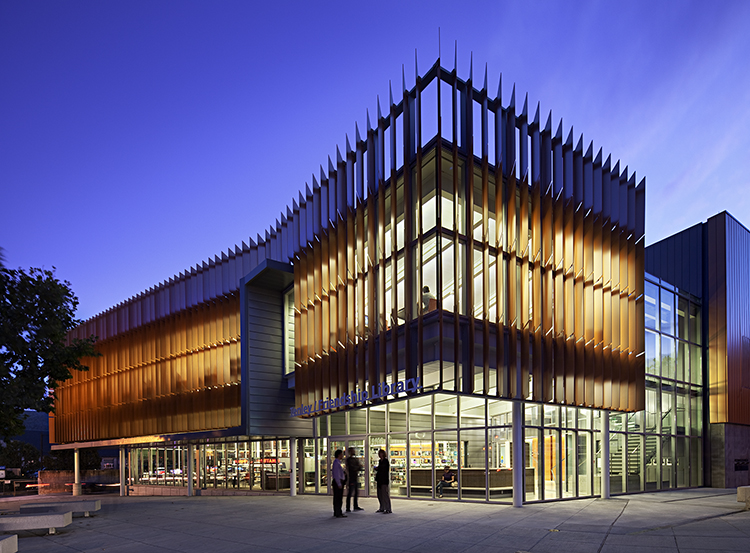Global architecture and design firm Perkins+Will announced today that they have signed an agreement which will result in The Freelon Group joining forces with Perkins+Will.
Founded by Phil Freelon, FAIA, LEED AP in Research Triangle Park, N.C., The Freelon Group is world renowned for design excellence and consulting work with museums, libraries, universities, and other civic and institutional clients.
Perkins+Will offers a full range of architectural expertise from its offices in Charlotte and RTP, notably to healthcare, science and technology, education, corporate, commercial, civic, and cultural clients. These capabilities will be enriched by The Freelon Group’s similar work, expanding the firm’s portfolio in these sectors. The combined practice will have nearly 80 professionals creating one of the largest and most award-winning architecture and design practices in North Carolina.
The Freelon Group will bring a portfolio of design achievements on behalf of some of America’s most respected cultural institutions including the Smithsonian Institution’s National Museum of African American History and Culture in Washington, D.C., the National Center for Civil and Human Rights in Atlanta, the Emancipation Park in Houston, the Museum of the African Diaspora in San Francisco, and multiple projects for the Washington, D.C. Public Libraries.

The Tenley Library, a Washington, D.C. Public Library designed by Freelon. Photo credit: Mark Herboth Photography
“By joining Perkins+Will, we can offer our clients in North Carolina and around the world a full spectrum of services for just about any type of project,” said Freelon. “The firms are ideally matched as we share a dedication to design excellence and commitment to social responsibility.”
Upon completion of the transaction, Freelon will assume a key leadership role at Perkins+Will in both North Carolina and globally. As the Managing and Design Director of the North Carolina practice, he will lead both Perkins+Will North Carolina offices in RTP and Charlotte. Freelon will come to Perkins+Will as an important member of the firmwide leadership team and will join the Board of Directors. He will also be a key leader for the firm's cultural and civic practice.
Freelon founded The Freelon Group in 1990. He is the recipient of the Thomas Jefferson Award for Public Architecture from the American Institute of Architects (AIA) and a member of the AIA College of Fellows.
He was appointed by President Obama to serve on the National Commission of Fine Arts and earned the academic appointment of Professor of Practice at the Massachusetts Institute of Technology (MIT) School of Architecture and Planning, where he will continue to be a member of the faculty.
Freelon has lectured at more than 30 major universities, museums, and other prominent venues, and his work has been published globally. A native of Philadelphia, Freelon earned his Bachelor of Environmental Design in Architecture degree from North Carolina State University and his Master of Architecture degree from MIT. He also received a Loeb Fellowship and spent a year of independent study at the Harvard University Graduate School of Design.
“With Phil Freelon, his experienced team of 40 designers, and other professionals who intend to join Perkins+Will, we look forward to offering clients a deeper level of cultural design expertise,” said Perkins+Will President and Chief Executive Officer Phil Harrison, FAIA, LEED AP. “Phil will further strengthen our leadership team and is a natural complement to the design excellence culture at Perkins+Will.”
Perkins+Will employees in the RTP office intend to relocate to The Freelon Group’s RTP office space. This office will work collaboratively with the Perkins+Will Charlotte office to service clients throughout North Carolina, nationally, and globally. Under Freelon’s direction, current Perkins+Will leadership will continue to serve the North Carolina practice, with David Brownlee in the role of Director of Operations in the RTP office and David Gieser as Director of Operations in the Charlotte office.
Related Stories
Curtain Wall | Aug 15, 2024
7 steps to investigating curtain wall leaks
It is common for significant curtain wall leakage to involve multiple variables. Therefore, a comprehensive multi-faceted investigation is required to determine the origin of leakage, according to building enclosure consultants Richard Aeck and John A. Rudisill with Rimkus.
MFPRO+ News | Aug 14, 2024
Report outlines how Atlanta can collaborate with private sector to spur more housing construction
A report by an Urban Land Institute’s Advisory Services panel, commissioned by the city’s housing authority, Atlanta Housing (AH), offered ways the city could collaborate with developers to spur more housing construction.
Adaptive Reuse | Aug 14, 2024
KPF unveils design for repositioning of Norman Foster’s 8 Canada Square tower in London
8 Canada Square, a Norman Foster-designed office building that’s currently the global headquarters of HSBC Holdings, will have large sections of its façade removed to create landscaped terraces. The project, designed by KPF, will be the world’s largest transformation of an office tower into a sustainable mixed-use building.
Sustainability | Aug 14, 2024
World’s first TRUE Zero Waste for Construction-certified public project delivered in Calif.
The Contra Costa County Administration Building in Martinez, Calif., is the world’s first public project to achieve the zero-waste-focused TRUE Gold certification for construction. The TRUE Certification for Construction program, administered by Green Business Certification Inc. (GBCI), recognizes projects that achieve exceptional levels of waste reduction, reuse, and recycling.
Modular Building | Aug 13, 2024
Strategies for attainable housing design with modular construction
Urban, market-rate housing that lower-income workers can actually afford is one of our country’s biggest needs. For multifamily designers, this challenge presents several opportunities for creating housing that workers can afford on their salaries.
University Buildings | Aug 12, 2024
Planning for growing computer science programs
Driven by emerging AI developments and digital transformation in the business world, university computer science programs are projected to grow by nearly 15% by 2030.
Energy Efficiency | Aug 9, 2024
Artificial intelligence could help reduce energy consumption by as much as 40% by 2050
Artificial intelligence could help U.S. buildings to significantly reduce energy consumption and carbon emissions, according to a paper by researchers at the Lawrence Berkeley National Laboratory.
Sponsored | Healthcare Facilities | Aug 8, 2024
U.S. healthcare building sector trends and innovations for 2024-2025
As new medicines, treatment regimens, and clinical protocols radically alter the medical world, facilities and building environments in which they take form are similarly evolving rapidly. Innovations and trends related to products, materials, assemblies, and building systems for the U.S. healthcare building sector have opened new avenues for better care delivery. Discussions with leading healthcare architecture, engineering, and construction (AEC) firms and owners-operators offer insights into some of the most promising directions. This course is worth 1.0 AIA/HSW learning unit.
Office Buildings | Aug 8, 2024
6 design trends for the legal workplace
Law firms differ from many professional organizations in their need for private offices to meet confidentiality with clients and write and review legal documents in quiet, focused environments
Data Centers | Aug 8, 2024
Global edge data center market to cross $300 billion by 2026, says JLL
Technological megatrends, including IoT and generative AI, will require computing power to be closer to data generation and consumption, fueling growth of edge IT infrastructure, according to a new JLL report.

















